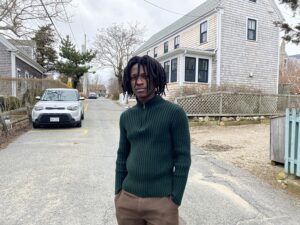When Adeniyi Ademoroti sits down to write a story, there are always two things in his head: the first sentence and the final scene. “If I don’t have anything I’m writing toward, it’s going nowhere,” he says. For him, the task of writing is filling in the gap.

Perhaps the strength of these final scenes are why Ademoroti’s stories are so cathartic. The author’s protagonists are complicated people who, more often than not, are the biggest impediments to their own happiness — an alcoholic schoolteacher who lost the will to strive for anything, a schoolboy with a repressed crush on a classmate — and watching these characters grow in subtle but important ways is one of the chief joys of reading his work. The protagonist of the novel Ademoroti is working on as a writing fellow at the Fine Arts Work Center this winter is no exception — he’s a closeted gay father who hates his son for being able to express his sexuality freely.
Ademoroti grew up in Lagos, the enormous city on Nigeria’s southwestern coast. He discovered his passion for writing five years into a program in real estate management that he hated at Obafemi Awolowo University. He remembers waking up one day and thinking, “I want to be a writer.” He wrote two flash fiction stories that same day, one of which he submitted with his application to a writing workshop run by the nonprofit Farafina Trust and hosted by Nigerian author and 2008 MacArthur Fellow Chimamanda Ngozi Adichie. He got in.
Adichie’s workshop was a formative experience for Ademoroti. His favorite books had mostly been by Dan Brown and John Grisham — “I didn’t really know the existence of better books,” he says — and the workshop helped change that.
In one session, another student asked Adichie whether they should apply to a creative writing M.F.A. program to further their career. Ademoroti remembers her response vividly: “She said, ‘Don’t think about that stuff yet. Just go out into the world and actually write and live.’ ”
He followed that advice. During his compulsory year with Nigeria’s National Youth Service Corps, in which university graduates participate in governmental affairs, he went to the city of Kano near Nigeria’s northern border, a part of the country that was under regular threat at the time from the terrorist organization Boko Haram.
In Kano, Ademoroti found himself isolated and with a surprising amount of time on his hands. He took advantage of it, turning the year into “my own sort of residency of just writing and writing and writing and reading and reading and reading,” he says.
The next year, he got a job at the Nigerian magazine Bella Naija. Soon after, he was accepted at the prestigious M.F.A. program at the Iowa Writers’ Workshop.
Ademoroti is a rigorous reviser. He says he lets his subconscious guide the story in surprising ways. Characters who were based on people he knows or on himself suddenly begin doing things that those people never would. “It’s always fun to watch that happen,” he says, laughing.
Ademoroti is drawn to writing with “dirty, masculine voices.” That type of voice is apparent in “Velvet,” his short story about an alcoholic schoolteacher named Bolaji who views the world through anger and self-loathing. “The children file into the room and honestly Bolaji just wants to die,” the story begins. A few lines later: “How ridiculous, the expectation, quiet, of children for whom disorder, noise, is impulse.”
It is only when that façade slips, when Bolaji fantasizes about a relationship with a colleague, that Ademoroti reveals his ability for vivid, lyrical description, too: “He sees their eight limbs, sweating torsos, all of them one, roiling across the vast sea of a bed, tangled in cerulean sheets, sun orange and falling through a screen brick.”
He starts every morning at FAWC by reading a short story and then writes from 8 a.m. to noon. He uses most of his afternoon to read, save for a nap or a visit to the gym. He also watches a movie every night, as part of his quest to watch every queer film ever made.
It was this pursuit that gave him the idea for his novel. He had watched The Man in the Orange Shirt, a movie about a grandfather and grandson and their respective gay relationships as young men in the 1940s and the 2010s. He was fascinated by this intergenerational framing device, and he combined the film’s conceit with a true story he read online about a closeted father resentful of his recently-out gay son.
Ninety pages into the novel, he decided it was a disaster. His adviser, however, encouraged him to finish it. He set aside the novel until about a year later, when he was reading the Joseph Brodsky book Watermark. He was captivated that the author’s voice was not only masculine but also poetic.
The possibility of his own version of that voice stayed with him, he says. Whole paragraphs took shape in his mind, and he put them down as he heard them, beginning a second draft of his novel. Finally, in an experience that was more auditory than analytical, he was beginning to reconceive the novel’s form. He’s still working on it but writing feels easier now. “I figured out what I wanted it to sound like,” he says.



